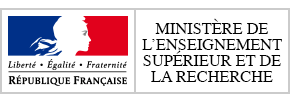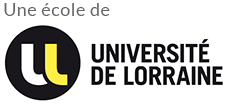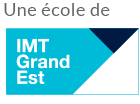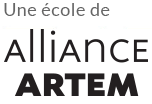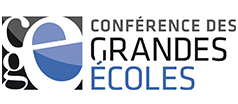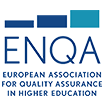Seven reasons to choose Mines Nancy
1. An appealing programme
A seamless pathway for holders of a DUT, BTS or second-year BUT technical diploma, an engineering degree highly sought after by companies, real career prospects.
2. Differentiation
A large place is given to industrial projects, classes promoting creativity and initiative, and personal coaching.
3. Artem
A cross-disciplinary concept combining art, science and business and its physical embodiment – the ArtemLab: a collection of open-plan learning spaces where students have access to the latest generation digital
tools.
4. International
Six months on average spent overseas, 20% of time spent on language learning, double degrees, option to spend the third year in one of over 80 universities abroad.
5. Employement
16 months of industry experience, close links with companies promising swift employability after graduation.
6. Nancy
With more than 40,000 students, Nancy is recognised for the quality of its student life: events, culture, sport and much more!
7. High-tech Campus
An environment of excellence located in the heart of Nancy.
Benefits of the course
Unique qualities
- Agility: The ability to be inclusive and collaborate with others, have solid scientific knowledge and work across professional boundaries.
- Creativity: Demonstrate imagination and ingenuity; dare to challenge conventions to design the innovations of tomorrow.
- Expertise: Apply rigorous methodology (experimentation, observation, modelling) to solve clearly defined scientific, technological and/or organisational questions.
- Innovation: Focus on progress, create the conditions for innovation and contribute to the positive development of society.
- Leadership: Have an entrepreneurial spirit, develop and realise ideas and combine economic principles and a socially responsible approach in a fluctuating environment.
- Inclusion: Understand and embrace other cultures, use difference as an advantage and develop culturally specific communication strategies.
- Responsibility: Act as a responsible and human-centred engineer and
place the global challenges of sustainable development and social responsibility at the heart of your professional commitment.
First year:
Goals
Strengthen skills in basic scientific disciplines (Maths, Heat, Information, Electricity, Elasticity, Mechanics, Fluid Mechanics, etc.).
Programme :
- Science: 160 hrs
- Materials: 150 hrs
- Production Management: 75 hrs
- Languages and Communication: 230 hrs
- Engineering Technical Environment: 50 hrs
- Humanities: 20 hrs
- Work placement: 5 months
Second year
Goals
Emphasise specialist teaching in materials science and industrial management to understand industrial issues and the complexity of the economic world.
Programme :
- Science: 80 hrs
- Materials: 200 hrs
- Production Management: 160 hrs
- Languages and Communication: 130 hrs
- Engineering Technical Environment: 90 hrs
- Work placement: 5 months
Third year
Goals
Become an expert in studying the conditions for producing a manufactured product from the viewpoint of technical, human and economic resources.
Programme :
- Science: 30 hrs
- Materials: 160 hrs
- Production Management: 330 hrs
- Languages and Communication: 150 hrs
- Engineering Technical Environment: 35 hrs
- Humanities: 18 hrs
- Work placement: 6 months
Teaching themes
The syllabus of the Engineering degree with the Industrial Engineering and Materials specialisation aims to give students a high level of skills in two complementary fields: materials and production management. Engineers who complete the course will be operational to work on assembly and manufacturing lines for any company producing material goods.
With this in mind, the majority of classes over the three years are focused on two specialisations:
- Materials Science and Engineering
- Production Management
Complemented by:
- General science classes such as maths, which allow students to get the most from the course and form the background of every variety of
engineer. - Courses providing insights into other specialisations pursued by engineers and technicians in a company, such as mechanical and electrical engineering.
- Classes on communication techniques and languages.
- A course focusing on physical exercise and the body.
- Lectures given by working production engineers
Detailed program
|
First year |
60 ECTS |
||
|---|---|---|---|
|
Goals: Strengthen skills in basic scientific disciplines (Maths, Heat, Information, Electricity, Elasticity, Mechanics, Fluid Mechanics, etc.). |
|||
|
EU1 Science |
7 ECTS 160h |
|
|
|
Electricity |
|
||
|
Fluid Mechanics |
|
||
|
Thermodynamics |
|
||
|
Computer Science |
|
||
|
Maths |
|
||
|
Refresher in Physics (Quitus) |
|
||
|
EU2 Materials |
7 ECTS 150h |
|
|
|
Crystallography |
|
||
|
Elasticity |
|
||
|
Physical Metallurgy |
|
||
|
Material Strength |
|
||
|
Refresher in Industrial Design (Quitus) |
|
||
|
EU3 Production Management |
4 ECTS 75h |
|
|
|
Business Economics |
|
||
|
Introduction to Production Management |
|
||
|
Operational Research |
|
||
|
CDAYS |
|
||
|
EU4 Languages and Communication |
9 ECTS 230h |
|
|
|
English |
|
||
|
German or Spanish (Quitus) |
|
||
|
Written and Oral Expression |
|
||
|
Excel Programming |
|
||
|
Digital Gateway |
|
||
|
EU5 Engineering Technical Environment |
3 ECTS 50h |
|
|
|
Automation |
|
||
|
HSE |
|
||
|
Mechanics |
|
||
|
EU6 Humanities |
20h |
|
|
|
Sport (Quitus) |
|
||
|
EU7 Work placement |
30 ECTS |
|
|
|
5 months |
|
||
|
Second year |
60 ECTS |
||
|
Goals: Emphasise specialist teaching in materials science and industrial management to understand industrial issues and the complexity of the economic world. |
|||
|
EU1 Science |
6 ECTS 80h |
|
|
|
Computer Science |
|
||
|
Mathematics |
|
||
|
Thermodynamics |
|
||
|
EU2 Materials |
9 ECTS 200h |
|
|
|
Ferrous Alloys/Non-ferrous Alloys |
|
||
|
Casting |
|
||
|
Forming |
|
||
|
Polymers |
|
||
|
Analysis Methods |
|
||
|
Phase Transformation |
|
||
|
Practical Metallurgy |
|
||
|
EU3 Production Management |
6 ECTS 160h |
|
|
|
Business Economics and Organisation |
|
||
|
Methods and Tools for Industrial Management |
|
||
|
Group Problem Solving Methods |
|
||
|
Production Optimisation and Management |
|
||
|
EU4 Languages and Communication |
6 ECTS 130h |
|
|
|
English |
|
||
|
German or Spanish (Quitus) |
|
||
|
Marketing Communications |
|
||
|
EU5 Engineering Technical Environment |
3 ECTS 90h |
|
|
|
Electrotechnology |
|
||
|
CAD |
|
||
|
Industrial Computing |
|
||
|
EU6 Work placement |
30 ECTS |
|
|
|
5 months |
|
||
|
Third year |
60 ECTS |
||
|
Goals: Become an expert in studying the conditions for producing a manufactured product from the viewpoint of technical, human and economic resources. |
|||
|
EU1 Science |
3 ECTS 30h |
|
|
|
Statistics |
|
||
|
EU2 Materials |
9 ECTS 160h |
|
|
|
Ceramic and Glass |
|
||
|
Choosing Materials |
|
||
|
Corrosion |
|
||
|
Physical and Chemical Treatments |
|
||
|
Polymers |
|
||
|
Composites |
|
||
|
EU3 Production Management |
12 ECTS 330h |
|
|
|
Industrial Management |
|
||
|
Management |
|
||
|
Six sigma |
|
||
|
Progress Management |
|
||
|
Stochastic Methods and Production Management |
|
||
|
Clean and Safe Production |
|
||
|
Flow Analysis |
|
||
|
Employment Contract |
|
||
|
Information Management Systems |
|
||
|
Industrial Project in Business |
|
||
|
EU4 Languages and Communication |
6 ECTS 150h |
|
|
|
English |
|
||
|
German or Spanish (Quitus) |
|
||
|
EU5 Engineering Technical Environment |
35h |
|
|
|
Industrial Computing |
|
||
|
E-business/Serious Games |
|
||
|
EU6 Humanities |
30h |
|
|
|
Conferences |
|
||
|
EU7 Work placement |
30 ECTS |
|
|
|
6 months |
|
||
Teaching methods
The keys to success
Excellent content for professional development
Strong partnership with industry players: specialised teaching, industrial projects, one-off participation and events (Forum Est Horizon, business meetings, technical days, company visits); dual skills in materials and
production management – the engineering graduate will be able to examine the conditions for making a product and optimising the stages of a process.
Applied insights
Beyond the insights classes that promote cultural exchanges and allow engineering students to cross paths with the designers and managers of tomorrow, Artem gives students the opportunity to participate in “Artem Insight” for a week.
This unique and innovative educational programme immerses third-year students from the three schools – Mines Nancy, ICN Business School and the Nancy National School of Art and Design – into the heart of the realities of the professional world. It gives them the opportunity to observe, analyse and make recommendations for ideas and well-reasoned responses to the kinds of problems presented by partner
companies.
Industry in our DNA
The Industrial Engineering and Materials course is delivered by a teaching staff made up of research lecturers and industry professionals.
This is the hallmark of a degree programme that, since its inception on the initiative of Mines Nancy and three long-standing partners – Renault, Saint-Gobain PAM and Arcelor Mittal – has proven its ability to meet the expectations of companies by staying one step ahead of them. This industrial DNA is a major contributor to the excellent results posted by the Industrial and Materials Engineering course in terms of graduate employability.
Projects
Project-based learning to hone the student’s creativity and sense of
initiative.
The three years of the course are punctuated by projects. Each project team (three or four students) addresses an industry-related problem and is required to form the group, define specifications and plan the tasks to
meet the allotted deadline.
Work placements
Ready to work!
As a central component of the syllabus, in- company placements are a perfect complement to general, scientific and technological classes and fully aligned with students’ career plans. Overall, our student engineers carry out three placements of five to six months each and complete one industry project. All the more opportunities to hone their knowledge of the business world and develop their creativity and sense of initiative.
Professional and personal support
Bespoke support!
The support system in place to help Mines Nancy engineering students with their personal and career plans (student orientation and employability programme in Saint-Dié) is based on several combined programmes, alternating individual and group phases throughout the course. It involves the teaching staff, the course managers and the education managers, overseen by a careers manager who organises planning sessions through the duration of the course.
From the first year, students are encouraged to start thinking about compiling their skills portfolio (using the self-assessment tool: the PEC). Visits to companies and research laboratories, student-alumni meet-ups, the Forum Est-Horizon, the technology day, visiting industry professionals taking part in classes and the departmental weeks are all
opportunities to fine-tune your career plan, while industrial projects, placements in industry and learning in connection with your employer are all ways to turn your ideas into concrete reality.
As part of the individualised support programme in place for personal and career plans at Mines Nancy, overseen by Ulrike Braun, in charge of student orientation and employability, several events take place throughout the year:
-
Student-alumni meet-ups
Informal gatherings between alumni and current students, co-organised with students (BDE, Junior Entreprise, Forum Est Horizon, MiNE). Ambassadors meet up with students to help them define their career plan by sharing information about their current job, the business sector they work in, their academic career at the university and how this ties in with their career progression. The student-alumni meet-ups were started in 2008 and since then have brought together almost 300 alumni over 20 seasons.
-
Employability coaching
For more than three years, the school has been offering final year students the chance to take part in five interactive workshops in
small groups (six students) to assess their skills, based on the co-orientation® method, deployed at the École des Mines de Paris for
ten years.
-
1 day, 1 Alumni, 1 Mines student
About thirty students took part in the “1j1a1m” event, which sees a Mines student shadowing an alumnus at work. This rewarding experience gives students the opportunity to compare the theoretical notions regarding different engineering professions addressed during the course with the reality on the ground.
Double degree
The Industrial Engineering and Materials course pays particular attention to language teaching – chiefly English and German – and to international openness.
International openness and the possibility of obtaining a double degree
Particular attention is paid to the teaching of English. Other languages (German, Spanish, Italian, Russian, Japanese, Chinese) are optional or accessible on a voluntary basis.
For students following the “standard” course, the third year of teaching can be completed in a foreign university (Germany, Canada, Spain, Sweden, etc.) or a different French university.
The second-year industrial work placement is the one that can most easily be spent abroad. There are plenty of opportunities in most European countries as well as in North America and Asia.
The possibility of obtaining a double degree :
Mines Nancy and the Mannheim Hochschule signed a double degree agreement in 1994, which allows German-speaking engineering students to spend 18 months in Germany with financial support from the Franco-German University.
The first semester at Mines Nancy includes specific language preparation. It is followed by a three-week stay at the Hochschule in Mannheim, which helps to reinforce and deepen the practice of German.
The second-semester work placement takes place in a German company.
The third semester, at the Hochschule in Mannheim, leads to the Maschinenbau bachelor’s degree.
In the fourth semester, if the results meet the required level, students continue their education at the Hochschule. After the fifth semester at Mines Nancy, and the sixth at a company, they obtain the Maschinenbau Master’s and the engineering degree from the École des Mines de Nancy specialising in Industrial Engineering and Materials.
Similar agreements have been signed with the École Polytechnique d’Agadir and the National University of Colombia (UNAL).
Application form
If you are in the second year of a BUT or studying for a DUT or BTS and you want to enrol on the Industrial Engineering and Materials specialisation in the engineering course, download your application form free of charge on this page.
2023 application schedule
Application form available: Wednesday 1 March 2023
Form submission deadline: Tuesday 2 May 2023 for the academic year starting in September 2023 (evidenced by the postmark).
Initial selection by a jury based on application forms: Tuesday 16 May 2023 at 2 p.m.
Candidates will be informed individually by post and email following this initial selection.
Final selection interview: Friday 2 June 2023 from 8 a.m.
- Interview by a jury made up of industrialists and academics to assess the
candidates’ personalities, motivations and career plans. - Final selection by the jury following these interviews.
Start of course for 1st-year engineering students: Tuesday 5 September 2023 at 10 a.m.
First year
First-year admission requirements :
- A second-year BUT degree
- A DUT degree (see list of departments below)
- A BTS degree
- POLYTECHNIC PREPARATORY CYCLE (CPP): INP Preparatory Cycle
- PT or TSI preparatory class
- ATS preparatory class
- Vocational Degree (LP)
List of the main DUT accepted*
- Chemistry (Materials pathway)
- Civil Engineering
- Industrial Engineering and Maintenance
- Mechanical and Production Engineering
- Thermal Engineering and Energy
- Physical Measurements
- Metrology and Quality Control
- Industrial Logistics Performance and Organisation
- Materials Science and Engineering
List of the main BTS accepted*
- Industrial Design Assistant
- Engineering Technical Assistant
- Chemistry (Materials pathway)
- Bodywork Design and Production
- Design and Production of Materials Forming Tools
- Industrial Product Design
- Metal Construction
- Shipbuilding
- Electrical Engineering
- Materials Forming by Forging
- Ceramic industries
- Flexible Materials Industries
- Automotive Maintenance and After-sales
- Industrial Maintenance
- Mechanics and Industrial Automation
- Physical Metallography
- Plastics and Composites
- Production
- Wood and Furniture Production
- Casting
- Industrial Boiler Design and Production
- Physical Technologies for Industry and Laboratories
- Materials Processing
*Applications from candidates whose subject is not listed are examined on a case-by-case basis
For second year
Second-year admission requirements:
- Bac + 4, Master 1 level
- Vocational University Institute courses
- Professionalized (IUP label)
- Courses delivered by the Conservatoire National des Arts et Métiers (CNAM)
Continuing education
Continuing education admission requirements (second year):
Admission into the second year is permitted for holders of a DUT, BTS or second-year BUT with at least three years’ professional experience. In the first round, students are selected based on their academic or professional record. A second round is based on the results of an interview to assess the candidate’s character and motivation before a panel of industry professionals and academics.
The university fees are the same as are paid to any public higher education institution. The tuition fees are €15,000 for the two years (€7,500 per year).
Admission
The Engineering degree with a specialisation in Industrial Engineering and Materials teaches engineers how to assume responsibilities within production units.
Admission requirements
Candidates must hold an undergraduate degree in a science subject or equivalent and demonstrate at least three years’ experience as a senior technician in a company.
Admissions procedure
The admissions procedure applies for the second-year intake:
- Candidates are selected based on the results of written exams on the main subjects taught in the first year. After this process and depending on the results obtained, a personalised refresher programme may be offered to certain candidates,
- Periodic meetings with the teachers are scheduled to evaluate the progress of the student’s preparatory classes,
- The jury examines the student’s application and assesses, during an interview, the candidate’s motivation and character and reviews the results of the refresher classes and the school’s recommendations. It then determines whether or not the student can move up to the second year.
Tuition fees
The tuition fees are €7,500 a year, i.e. €15,000 for the two years (€9,000 for non-funded candidates). The university fees are the same as are paid to any public higher education institution.
Professionalisation contract
The professionalisation contract is aimed at students at the end of the second year hired by a company to complete their third year on a work-study basis.
It is a fixed-term employment contract for 12 months: it alternates periods of study (in-person at Mines Nancy and remotely) and periods of work in a company.
At the end of the professionalisation contract, the student-employee has the professional know-how they need and is awarded the title of Engineer specialising in Industrial Engineering and Materials (degree registered with the National Directory of Professional Certifications), identical to students following the traditional pathway.
Benefits for students
- Benefit from a learning programme aligned with their career plans,
- Obtain a recognised degree qualification while gaining work experience and a salary (gross salary: €1,184.21),
- Receive support from a tutor, an employee of the host company, who facilitates their onboarding and acquisition of the corporate culture,
- Status: same entitlements as other employees (paid leave, employee insurance (CPAM) and company’s mutual health insurance, etc.) compatible with taking the course.
Benefits for the company
- Receive financial support from its designated training funding commission (OPCA) which covers training costs based on an hourly rate. If the budget covered by the OPCA is exceeded, the difference can be charged to the vocational training budget,
- Receive funding from the OPCA for training a tutor and the expenses related to this role,
- Hire a new employee who will be partly trained by the company,
- Exemption from employers’ social security contributions (except for accidents at work/occupational illnesses) and government subsidies according to the legislation in force depending on the size of the company,
- Responds to the obligation to hire work-study trainees and exemption from the supplementary apprenticeship contribution (CSA), subject to conditions, for companies with 250 or more employees that are liable for the apprenticeship tax (TA),
- Employees on professionalisation contracts are not included in the staff numbers for calculating tax and social contribution costs.
Course duration: 440 hours of teaching out of a total 1,460 hours of training.
Employability
Average time to find a job
Salary
Job locations
A solid training in languages, combined with a minimum stay of 10 weeks abroad, puts engineering students in the best possible position for an international career. A springboard that 20% of 2020 graduates took advantage of in their first job 22 % diplomas 2016
Sectors
Apply
Prepare your application
Admission is based on a review of the candidate’s academic record followed by an interview.
Prerequisites:
- Have a DUT, BTS or second-year BUT in the specialisations related to the course.
- e pre-selected by the juryB.
Fees and financial support
Enrolment fee
Free (download below)
Tuition fees
€2,500 per year
Student Life and Campus Contribution (CVEC)
around €92 per year
Scholarship students
Scholarship students are exempt from tuition and CVEC fees
Financial support
Students can benefit from scholarships and housing assistance
Stage 1
Wednesday 1 March 2023
Application forms available
Stage 2
Tuesday 2 May 2023
Deadline for submission of applications
Stage 3
Tuesday 16 May 2023 at 2 p.m.
Initial selection by a jury based on application forms
Stage 4
Friday 2 June 2023 from 8 a.m.
Final selection interview
Course begins
Tuesday 5 September 2023 at 10 a.m.
Course begins for first-year students
Admission requirements
Admission into the second year is permitted for:
- holders of a DUT, BTS or second-year BUT with at least three years’ professional experience.
In the first round, students are selected based on their academic or professional record. A second round is based on the results of an interview to assess the candidate’s character and motivation before a panel of industry professionals and academics.
Contact
You want to contact us about the program Engineering degree with a specialisation in Industrial and Materials Engineering (GIM)? Please fill in form below:

